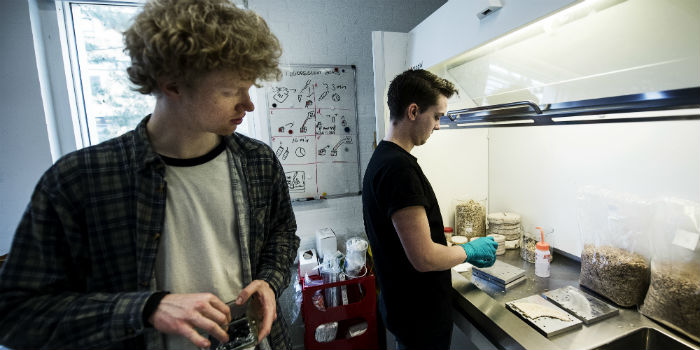Source: dtu.dk

Three students are using hemp and mushroom roots to grow the world’s first fully biodegradable surfboard in a mould.
Surfers care deeply about the health of the oceans—yet paradoxically—traditional surfboards comprise hazardous chemicals and non-biodegradable materials. Three design and innovation students from DTU are using their bachelor's project to address this problem.
“We’re trying to make the world’s first one hundred per cent biodegradable surfboard. Sustainable boards are in great demand in the surfing community, but there aren’t many people producing them,” says Dan Jensen—one of the students who also surfs in his spare time.
The team’s plan is literally to grow their surfboard in a large surfboard-shaped mould. The idea is to add hemp fibres and live mushroom roots to the mould which gradually fill the frame and bind together.
“It’s still a little unclear how the process of growing the board will actually work, but there’s nothing for it but to try—and see what works,” says Dan Jensen.
The three students’ surfboard will solely comprise natural materials. If the board breaks or is thrown away, it will literally become one with nature again—either as fertilizer to the soil or as food for the ocean’s marine life—because the board is biodegradable.
“We’ve succeeded in making the core of the surfboard from hemp and replacing the traditional binder with roots from a fungal forest. So now we need to find a hard shell that can hold it all together,” says project team member Kristian Ullum.
Traditional surfboards consist of a polystyrene core, a fibreglass shell, and a substance called epoxy resin, which binds everything together. In fact, the mixture is very similar to that used in making wind turbine blades. Combining the materials in this way creates what is known as a composite material, which poses several environmental challenges:
“When you melt the three unsustainable elements together into a composite material, they become almost impossible to separate from each other—nor can they be reused,” says Kristian Ullum, adding that the epoxy resin binder also contains toxins.
Not another marketing stunt
In fact, there are already surfboards on the market that are being marketed as both sustainable and organic. Just like normal surfboards, they have a polystyrene core, but the shell is often made of flax fibre instead of glass fibre, and the chemical epoxy resin is replaced by so-called ‘bioresin’.
In fact, there are already surfboards on the market that are being marketed as both sustainable and organic. Just like normal surfboards, they have a polystyrene core, but the shell is often made of flax fibre instead of glass fibre, and the chemical epoxy resin is replaced by so-called ‘bioresin’.
“We kind of felt that the sustainable surfboards you can buy are a marketing stunt aimed at selling yet another product under the eco-umbrella. Bioresin still contains three to five per cent standard epoxy resin, and you can’t separate the materials and reuse them,” says the project’s third participant, Lasse Sudergaard, emphasizing that it also takes a lot of energy to grow, harvest, and process flax.
Although current sustainable surfboards do not fully live up to their name, they still leave a smaller environmental footprint than traditional boards. The students’ goal is therefore to make their surfboard even more sustainable—but there is still some way to go.
“Our primary focus right now is to develop the material so that it becomes sufficiently solid. It’s a challenge when you’re using hemp and fungal roots. So it’s critical that we find the right shell,” says Lasse Sudergaard, adding:
“Palm leaves are reputedly very strong so we’ll be examining their sustainability in our next round of testing.”
Dynamic diversity It was Dan Jensen’s personal interest in surfing that led him to suggest to Lasse Sudergaard and Kristian Ullum that they work with sustainable surfboards as a special project. They liked the idea so much that they decided to make it their bachelor's project.
“We’re really a motley crew. Dan surfs, Lasse has always been a keen snowboard and skateboard enthusiast, and I’m a novice when it comes to the board world so I can look at everything with fresh eyes. I feel that our different levels of competence and insight into the surfboard world creates a good group dynamic,” says Kristian Ullum.
Although the three students do not yet have a finished surfboard, they hope to have a prototype ready for Green Challenge in 2018. Green Challenge is an environmental technology competition organized by DTU.
This year the competition was held on 22 June and the boys won first prize in the bachelor final project category.
The three students feel that their success in developing their biodegradable surfboard is in no small part due to the support—in the form of materials and facilities—which they have received from DTU Skylab.
No comments:
Post a Comment